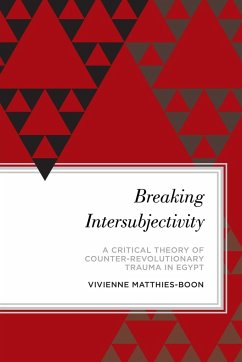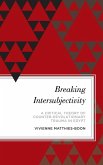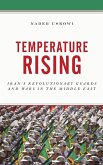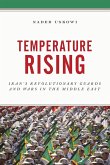Vivienne Matthies-Boon
Breaking Intersubjectivity
A Critical Theory of Counter-Revolutionary Trauma in Egypt
Vivienne Matthies-Boon
Breaking Intersubjectivity
A Critical Theory of Counter-Revolutionary Trauma in Egypt
- Broschiertes Buch
- Merkliste
- Auf die Merkliste
- Bewerten Bewerten
- Teilen
- Produkt teilen
- Produkterinnerung
- Produkterinnerung
Rejecting the concept of PTSD, Matthies-Boon develops an alternate theory of trauma using the Egyptian revolution as a case. The testimonies of Cairene activists explain how multileveled traumatic status subordination inflicted on them destroyed the potentiality of revolutionary collective becoming, resulting in demoralized, depoliticized silence.
Andere Kunden interessierten sich auch für
![Breaking Intersubjectivity Breaking Intersubjectivity]() Vivienne Matthies-BoonBreaking Intersubjectivity129,99 €
Vivienne Matthies-BoonBreaking Intersubjectivity129,99 €![Breaking Cycles of Violence in Israel and Palestine Breaking Cycles of Violence in Israel and Palestine]() Franke WilmerBreaking Cycles of Violence in Israel and Palestine120,99 €
Franke WilmerBreaking Cycles of Violence in Israel and Palestine120,99 €![Temperature Rising Temperature Rising]() Nader UskowiTemperature Rising102,99 €
Nader UskowiTemperature Rising102,99 €![Temperature Rising Temperature Rising]() Nader UskowiTemperature Rising57,99 €
Nader UskowiTemperature Rising57,99 €![Civil-Military Relations in the Modern Middle East Civil-Military Relations in the Modern Middle East]() David S. SorensonCivil-Military Relations in the Modern Middle East44,99 €
David S. SorensonCivil-Military Relations in the Modern Middle East44,99 €![A Century of Arab Politics A Century of Arab Politics]() Bruce Maddy-WeitzmanA Century of Arab Politics119,99 €
Bruce Maddy-WeitzmanA Century of Arab Politics119,99 €![Breaking Point Breaking Point]() Breaking Point88,99 €
Breaking Point88,99 €-
-
-
Rejecting the concept of PTSD, Matthies-Boon develops an alternate theory of trauma using the Egyptian revolution as a case. The testimonies of Cairene activists explain how multileveled traumatic status subordination inflicted on them destroyed the potentiality of revolutionary collective becoming, resulting in demoralized, depoliticized silence.
Hinweis: Dieser Artikel kann nur an eine deutsche Lieferadresse ausgeliefert werden.
Hinweis: Dieser Artikel kann nur an eine deutsche Lieferadresse ausgeliefert werden.
Produktdetails
- Produktdetails
- Verlag: Rowman & Littlefield Publishers
- Seitenzahl: 352
- Erscheinungstermin: 15. April 2024
- Englisch
- Abmessung: 229mm x 152mm x 21mm
- Gewicht: 572g
- ISBN-13: 9781538173008
- ISBN-10: 153817300X
- Artikelnr.: 70243855
- Herstellerkennzeichnung
- Libri GmbH
- Europaallee 1
- 36244 Bad Hersfeld
- gpsr@libri.de
- Verlag: Rowman & Littlefield Publishers
- Seitenzahl: 352
- Erscheinungstermin: 15. April 2024
- Englisch
- Abmessung: 229mm x 152mm x 21mm
- Gewicht: 572g
- ISBN-13: 9781538173008
- ISBN-10: 153817300X
- Artikelnr.: 70243855
- Herstellerkennzeichnung
- Libri GmbH
- Europaallee 1
- 36244 Bad Hersfeld
- gpsr@libri.de
Vivienne Matthies-Boon is Assistant Professor of the International Relations of the Middle East in the Department of Political Science, University of Amsterdam. She was an Assistant Professor in International Relations at the University of Groningen, an Assistant Professor in Sociology at the University of Surrey in the UK and a Duncan Norman Research Scholar at the University of Liverpool in the UK. She has an interdisciplinary background that is rooted in Philosophy, Sociology, Politics, Middle Eastern Studies, and Psychology. Being a critical theorist by heart and training, her main aim in her work is to explore greater existential questions related to notions of 'humanness', 'being' and 'suffering' within cross-cultural settings that are dominated by violence and conflict, with the hope of alleviating suffering, enabling understanding and seeking transformation of both self and others.
Acknowledgements
Introduction
Structure of the Book
Further Remarks
PART 1. TOWARDS A CRITICAL THEORY OF TRAUMA AS BROKEN SUBJECTIVITY
Introduction
Chapter 1. Trauma Studies and the Philosophy of the Subject
Towards Intersubjectivity: Habermas' Critique of the Philosophy of the
Subject
The Positivist Revolution and the Emergence of PTSD
Cognitive Trauma Theory: Intersubjectivity Within
Lazarus Never Dies: Anti-Mimeticism in Post-structural and Political Trauma
Chapter 2. Towards a Critical Trauma Studies: Trauma as Intersubjective
Alienation
On Heideggerian Trauma Theory: Struggles of Intersubjectivity
Traumatic Status Subordination: Nany Fraser
Traumatic Alienation: Rahel Jaeggi
Traumatic Instrumentality: Jurgen Habermas
Conclusion
PART 2. COUNTER-REVOLUTIONARY TRAUMA IN EGYPT: INFLICTING TRAUMATIC STATUS
SUBORDINATION
Introduction: Political Trauma in Egypt
Chapter 3. A Legacy of Traumatic Status Subordination in Egypt: From Nasser
to Mubarak
Maldistribution: Neoliberal Economics
Misrecognition: Security State Violence
Destroying Potentiality: Traumatic Alienation
Chapter 4. Revolutionary Becoming: The Politics of Prefigurative
Intersubjective Parity
Revolutionary Precursor: Kifaya
Egypt's 2011 Revolution: Politics of Intersubjective Parity
Chapter 5. Supreme Council of Armed Forces: The Politics of Traumatic
Status Subordination
Political Proceduralism: Colonising the Political Public Sphere
Constitutional Amendments
Repressive Juridification
Direct Physical Force: Disorientation and Isolation
Neoliberal Economic Rationalism
Chapter 6. Mohammed Morsi: The Politics of Traumatic Status Subordination
Political Proceduralism: Morsi's Struggle for Power
Direct Physical Force: Turning Violence Inwards
Neoliberal Economic Rationalism
Chapter 7. The Military's Deadly Return
Tamarrod and the June 30th Protests
The Rabaa Massacre
Chapter 8. Abdel Fattah el Sisi: The Politics of Traumatic Status
Subordination
Political Proceduralism: Sisi's Colonisation of the Political Public Sphere
Repressive Juridification of the Public Sphere
Direct Physical Force
Neoliberal Economic Rationalism
Conclusion
PART 3. BREAKING THE REVOLUTIONARY LIFEWORLD AND POTENTIAL OF CREATIVE
BECOMING
Introduction
Interregnum: Prefigurative Intersubjective Parity in Egypt's Revolutionary
Public Sphere
Chapter 9. Breaking the Lifeworld: On the Existential Burden of Violence
and Death
Being against Death: Clashes and the Politics of Violence, Death, and
Disorientation
Martyrs, Revolutionary Betrayal, and the Burden of Death
Chapter 10. Deepening Intersubjective Imparity: Turning Violence Inwards
Conspirational Victim Blaming and (Deadly) Revenge
Rabaa: Mass Murder and the Destruction of Potentiality
Social Death
The Destruction of Hope
Experiencing Existential Pain: Somatic Responses
Coping With the Counter-Revolution: Depoliticization
Chapter 11. Conclusion
Bibliography
About the Author
Index
Introduction
Structure of the Book
Further Remarks
PART 1. TOWARDS A CRITICAL THEORY OF TRAUMA AS BROKEN SUBJECTIVITY
Introduction
Chapter 1. Trauma Studies and the Philosophy of the Subject
Towards Intersubjectivity: Habermas' Critique of the Philosophy of the
Subject
The Positivist Revolution and the Emergence of PTSD
Cognitive Trauma Theory: Intersubjectivity Within
Lazarus Never Dies: Anti-Mimeticism in Post-structural and Political Trauma
Chapter 2. Towards a Critical Trauma Studies: Trauma as Intersubjective
Alienation
On Heideggerian Trauma Theory: Struggles of Intersubjectivity
Traumatic Status Subordination: Nany Fraser
Traumatic Alienation: Rahel Jaeggi
Traumatic Instrumentality: Jurgen Habermas
Conclusion
PART 2. COUNTER-REVOLUTIONARY TRAUMA IN EGYPT: INFLICTING TRAUMATIC STATUS
SUBORDINATION
Introduction: Political Trauma in Egypt
Chapter 3. A Legacy of Traumatic Status Subordination in Egypt: From Nasser
to Mubarak
Maldistribution: Neoliberal Economics
Misrecognition: Security State Violence
Destroying Potentiality: Traumatic Alienation
Chapter 4. Revolutionary Becoming: The Politics of Prefigurative
Intersubjective Parity
Revolutionary Precursor: Kifaya
Egypt's 2011 Revolution: Politics of Intersubjective Parity
Chapter 5. Supreme Council of Armed Forces: The Politics of Traumatic
Status Subordination
Political Proceduralism: Colonising the Political Public Sphere
Constitutional Amendments
Repressive Juridification
Direct Physical Force: Disorientation and Isolation
Neoliberal Economic Rationalism
Chapter 6. Mohammed Morsi: The Politics of Traumatic Status Subordination
Political Proceduralism: Morsi's Struggle for Power
Direct Physical Force: Turning Violence Inwards
Neoliberal Economic Rationalism
Chapter 7. The Military's Deadly Return
Tamarrod and the June 30th Protests
The Rabaa Massacre
Chapter 8. Abdel Fattah el Sisi: The Politics of Traumatic Status
Subordination
Political Proceduralism: Sisi's Colonisation of the Political Public Sphere
Repressive Juridification of the Public Sphere
Direct Physical Force
Neoliberal Economic Rationalism
Conclusion
PART 3. BREAKING THE REVOLUTIONARY LIFEWORLD AND POTENTIAL OF CREATIVE
BECOMING
Introduction
Interregnum: Prefigurative Intersubjective Parity in Egypt's Revolutionary
Public Sphere
Chapter 9. Breaking the Lifeworld: On the Existential Burden of Violence
and Death
Being against Death: Clashes and the Politics of Violence, Death, and
Disorientation
Martyrs, Revolutionary Betrayal, and the Burden of Death
Chapter 10. Deepening Intersubjective Imparity: Turning Violence Inwards
Conspirational Victim Blaming and (Deadly) Revenge
Rabaa: Mass Murder and the Destruction of Potentiality
Social Death
The Destruction of Hope
Experiencing Existential Pain: Somatic Responses
Coping With the Counter-Revolution: Depoliticization
Chapter 11. Conclusion
Bibliography
About the Author
Index
Acknowledgements
Introduction
Structure of the Book
Further Remarks
PART 1. TOWARDS A CRITICAL THEORY OF TRAUMA AS BROKEN SUBJECTIVITY
Introduction
Chapter 1. Trauma Studies and the Philosophy of the Subject
Towards Intersubjectivity: Habermas' Critique of the Philosophy of the
Subject
The Positivist Revolution and the Emergence of PTSD
Cognitive Trauma Theory: Intersubjectivity Within
Lazarus Never Dies: Anti-Mimeticism in Post-structural and Political Trauma
Chapter 2. Towards a Critical Trauma Studies: Trauma as Intersubjective
Alienation
On Heideggerian Trauma Theory: Struggles of Intersubjectivity
Traumatic Status Subordination: Nany Fraser
Traumatic Alienation: Rahel Jaeggi
Traumatic Instrumentality: Jurgen Habermas
Conclusion
PART 2. COUNTER-REVOLUTIONARY TRAUMA IN EGYPT: INFLICTING TRAUMATIC STATUS
SUBORDINATION
Introduction: Political Trauma in Egypt
Chapter 3. A Legacy of Traumatic Status Subordination in Egypt: From Nasser
to Mubarak
Maldistribution: Neoliberal Economics
Misrecognition: Security State Violence
Destroying Potentiality: Traumatic Alienation
Chapter 4. Revolutionary Becoming: The Politics of Prefigurative
Intersubjective Parity
Revolutionary Precursor: Kifaya
Egypt's 2011 Revolution: Politics of Intersubjective Parity
Chapter 5. Supreme Council of Armed Forces: The Politics of Traumatic
Status Subordination
Political Proceduralism: Colonising the Political Public Sphere
Constitutional Amendments
Repressive Juridification
Direct Physical Force: Disorientation and Isolation
Neoliberal Economic Rationalism
Chapter 6. Mohammed Morsi: The Politics of Traumatic Status Subordination
Political Proceduralism: Morsi's Struggle for Power
Direct Physical Force: Turning Violence Inwards
Neoliberal Economic Rationalism
Chapter 7. The Military's Deadly Return
Tamarrod and the June 30th Protests
The Rabaa Massacre
Chapter 8. Abdel Fattah el Sisi: The Politics of Traumatic Status
Subordination
Political Proceduralism: Sisi's Colonisation of the Political Public Sphere
Repressive Juridification of the Public Sphere
Direct Physical Force
Neoliberal Economic Rationalism
Conclusion
PART 3. BREAKING THE REVOLUTIONARY LIFEWORLD AND POTENTIAL OF CREATIVE
BECOMING
Introduction
Interregnum: Prefigurative Intersubjective Parity in Egypt's Revolutionary
Public Sphere
Chapter 9. Breaking the Lifeworld: On the Existential Burden of Violence
and Death
Being against Death: Clashes and the Politics of Violence, Death, and
Disorientation
Martyrs, Revolutionary Betrayal, and the Burden of Death
Chapter 10. Deepening Intersubjective Imparity: Turning Violence Inwards
Conspirational Victim Blaming and (Deadly) Revenge
Rabaa: Mass Murder and the Destruction of Potentiality
Social Death
The Destruction of Hope
Experiencing Existential Pain: Somatic Responses
Coping With the Counter-Revolution: Depoliticization
Chapter 11. Conclusion
Bibliography
About the Author
Index
Introduction
Structure of the Book
Further Remarks
PART 1. TOWARDS A CRITICAL THEORY OF TRAUMA AS BROKEN SUBJECTIVITY
Introduction
Chapter 1. Trauma Studies and the Philosophy of the Subject
Towards Intersubjectivity: Habermas' Critique of the Philosophy of the
Subject
The Positivist Revolution and the Emergence of PTSD
Cognitive Trauma Theory: Intersubjectivity Within
Lazarus Never Dies: Anti-Mimeticism in Post-structural and Political Trauma
Chapter 2. Towards a Critical Trauma Studies: Trauma as Intersubjective
Alienation
On Heideggerian Trauma Theory: Struggles of Intersubjectivity
Traumatic Status Subordination: Nany Fraser
Traumatic Alienation: Rahel Jaeggi
Traumatic Instrumentality: Jurgen Habermas
Conclusion
PART 2. COUNTER-REVOLUTIONARY TRAUMA IN EGYPT: INFLICTING TRAUMATIC STATUS
SUBORDINATION
Introduction: Political Trauma in Egypt
Chapter 3. A Legacy of Traumatic Status Subordination in Egypt: From Nasser
to Mubarak
Maldistribution: Neoliberal Economics
Misrecognition: Security State Violence
Destroying Potentiality: Traumatic Alienation
Chapter 4. Revolutionary Becoming: The Politics of Prefigurative
Intersubjective Parity
Revolutionary Precursor: Kifaya
Egypt's 2011 Revolution: Politics of Intersubjective Parity
Chapter 5. Supreme Council of Armed Forces: The Politics of Traumatic
Status Subordination
Political Proceduralism: Colonising the Political Public Sphere
Constitutional Amendments
Repressive Juridification
Direct Physical Force: Disorientation and Isolation
Neoliberal Economic Rationalism
Chapter 6. Mohammed Morsi: The Politics of Traumatic Status Subordination
Political Proceduralism: Morsi's Struggle for Power
Direct Physical Force: Turning Violence Inwards
Neoliberal Economic Rationalism
Chapter 7. The Military's Deadly Return
Tamarrod and the June 30th Protests
The Rabaa Massacre
Chapter 8. Abdel Fattah el Sisi: The Politics of Traumatic Status
Subordination
Political Proceduralism: Sisi's Colonisation of the Political Public Sphere
Repressive Juridification of the Public Sphere
Direct Physical Force
Neoliberal Economic Rationalism
Conclusion
PART 3. BREAKING THE REVOLUTIONARY LIFEWORLD AND POTENTIAL OF CREATIVE
BECOMING
Introduction
Interregnum: Prefigurative Intersubjective Parity in Egypt's Revolutionary
Public Sphere
Chapter 9. Breaking the Lifeworld: On the Existential Burden of Violence
and Death
Being against Death: Clashes and the Politics of Violence, Death, and
Disorientation
Martyrs, Revolutionary Betrayal, and the Burden of Death
Chapter 10. Deepening Intersubjective Imparity: Turning Violence Inwards
Conspirational Victim Blaming and (Deadly) Revenge
Rabaa: Mass Murder and the Destruction of Potentiality
Social Death
The Destruction of Hope
Experiencing Existential Pain: Somatic Responses
Coping With the Counter-Revolution: Depoliticization
Chapter 11. Conclusion
Bibliography
About the Author
Index









